GreatExam dumps for 70-462 exam are written to the highest standards of technical accuracy, provided by our certified subject matter experts and published authors for development. We guarantee the best quality and accuracy of our products. We hope you pass the exams successfully with our practice test. With our Microsoft 70-462 practice test, you will pass your exam easily at the first attempt. You can also enjoy 365 days free update for your product.
QUESTION 61
You administer a Microsoft SQL Server 2012 failover cluster that contains two nodes named Node A and Node B.
A single instance of SQL Server is installed on the cluster.
An additional node named Node C has been added to the existing cluster.
You need to ensure that the SQL Server instance can use all nodes of the cluster.
What should you do?
A. Create a ConfigurationFile.ini file from Node B, and then run the AddNode command-line tool on Node A.
B. Use Node A to install SQL Server on Node C.
C. Run the Add Node to SQL Server Failover Cluster Wizard on Node C.
D. Use Cluster Administrator to add a new Resource Group to Node B.
Answer: C
QUESTION 62
You administer a Microsoft SQL Server 2012 database.
The database contains a customer table created by using the following definition:
You need to ensure that the minimum amount of disk space is used to store the data in the customer table.
What should you do?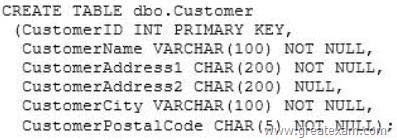
A. Implement row-level compression.
B. Implement page-level compression.
C. Convert all indexes to Column Store indexes.
D. Implement Unicode compression.
Answer: B
QUESTION 63
You are creating an application that will connect to the AgentPortal database by using a SQL login named AgentPortalUser.
Stored procedures in the database will use sp_send_dbmail to send email messages.
You create a user account in the msdb database for the AgentPortalUser login.
You use the Database Mail Configuration Wizard to create a Database Mail profile.
Security has not been configured for the Database Mail profile.
You need to ensure that AgentPortalUser can send email messages.
What should you do?
A. In the Database Mail Configuration Wizard, configure the Database Mail profile as a private profile for the AgentPortalUser account.
B. Disable the guest user in the msdb database.
C. Use the sysmail_help_profileaccount_sp stored procedure to add accounts to the Database Mail profile.
D. In the Database Mail Configuration Wizard, create an email account for each recipient’s email address in the Database Mail profile.
Answer: A
Explanation:
http://msdn.microsoft.com/en-us/library/ms189635.aspx
QUESTION 64
Drag and Drop Question
You administer a Microsoft SQL Server 2012 database.
You need to convert the database to a contained database.
You also need to ensure that all users are converted to contained users.
Which three actions should you perform in sequence? (To answer, move the appropriate actions from the list of actions to the answer area and arrange them in the correct order.)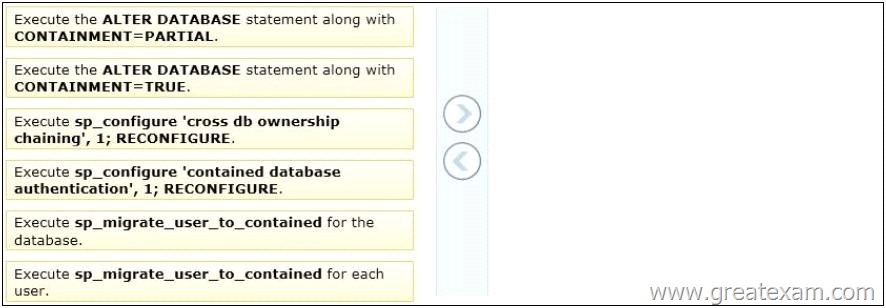
Answer: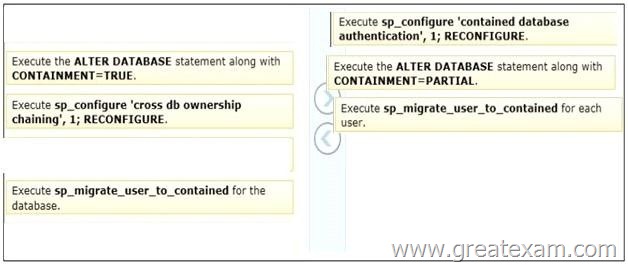
QUESTION 65
You administer a Microsoft SQL Server 2012 default instance.
The instance is hosted by a server that has a local firewall configured.
The firewall only allows inbound connections on port 1433.
The server only hosts a single instance of SQL Server.
You need to ensure that the instance is configured to allow remote connections even if the SQL Server is unresponsive to client connections.
What should you do? Choose all that apply.
A. Enable inbound connections on TCP port 1434 in the Windows Firewall on the server.
B. Execute the following Transact-SQL command:sp_configure ‘remote admin connections’,
C. Execute the Reconfigure command.
D. Execute the following Transact-SQL command:sp_configure ‘remote access’, 1
E. Restart the SQL Server Agent Service.
F. Enable inbound connections on TCP port 135 in the Windows Firewall on the server.
Answer: ABC
Explanation:
http://msdn.microsoft.com/en-us/library/ms191464.aspx
http://msdn.microsoft.com/en-us/library/ms190468.aspx
QUESTION 66
You administer all the deployments of Microsoft SQL Server 2012 in your company.
You need to ensure that an OLTP database that includes up-to-the-minute reporting requirements can be off- loaded from the primary database to another server.
You also need to be able to add indexes to the secondary database.
Which configuration should you use?
A. Two servers configured in different data centers
SQL Server Availability Group configured in Synchronous-Commit Availability Mode
One server configured as an Active Secondary
B. Two servers configured in the same data center
SQL Server Availability Group configured in Asynchronous-Commit Availability Mode
One server configured as an Active Secondary
C. Two servers configured in the same data center
A primary server configured to perform log-shipping every 10 minutes
A backup server configured as a warm standby
D. Two servers configured in different data centers
SQL Server Availability Group configured in Asynchronous-Commit Availability Mode
E. Two servers configured on the same subnet
SQL Server Availability Group configured in Synchronous-Commit Availability Mode
F. SQL Server that includes an application database configured to perform transactional replication
G. SQL Server that includes an application database configured to perform snapshot replication
H. Two servers configured in a Windows Failover Cluster in the same data center
SQL Server configured as a clustered instance
Answer: F
Explanation:
http://msdn.microsoft.com/en-us/library/ff878253.aspx#Indexing
To optimize read-only workloads on the readable secondary replicas, you may want to create indexes on the tables in the secondary databases. Because you cannot make schema or data changes on the secondary databases, create indexes in the primary databases and allow the changes to transfer to the secondary database through the redo process.
QUESTION 67
You administer all the deployments of Microsoft SQL Server 2012 in your company.
You need to ensure that data changes are sent to a non-SQL Server database server in near real time.
You also need to ensure that data on the primary server is unaffected.
Which configuration should you use?
A. SQL Server that includes an application database configured to perform transactional replication
B. Two servers configured in different data centers
SQL Server Availability Group configured in Asynchronous-Commit Availability Mode
C. Two servers configured in different data centers
SQL Server Availability Group configured in Synchronous-Commit Availability Mode
One server configured as an Active Secondary
D. SQL Server that includes an application database configured to perform snapshot replication
E. Two servers configured in the same data center
SQL Server Availability Group configured in Asynchronous-Commit Availability Mode
One server configured as an Active Secondary
F. Two servers configured on the same subnet
SQL Server Availability Group configured in Synchronous-Commit Availability Mode
G. Two servers configured in a Windows Failover Cluster in the same data center
SQL Server configured as a clustered instance
H. Two servers configured in the same data center
A primary server configured to perform log-shipping every 10 minutes
A backup server configured as a warm standby
Answer: A
Explanation:
http://msdn.microsoft.com/en-us/library/ms151149.aspx
QUESTION 68
You administer all the deployments of Microsoft SQL Server 2012 in your company.
A database contains a large product catalog that is updated periodically.
You need to be able to send the entire product catalog to all branch offices on a monthly basis. Which configuration should you use?
A. Two servers configured in the same data center
A primary server configured to perform log-shipping every 10 minutes
A backup server configured as a warm standby
B. SQL Server that includes an application database configured to perform transactional
replication
C. Two servers configured in the same data center
SQL Server Availability Group configured in Asynchronous-Commit Availability Mode
One server configured as an Active Secondary
D. Two servers configured in a Windows Failover Cluster in the same data center
SQL Server configured as a clustered instance
E. SQL Server that includes an application database configured to perform snapshot
replication
F. Two servers configured in different data centers
SQL Server Availability Group configured in Synchronous-Commit Availability Mode
One server configured as an Active Secondary
G. Two servers configured on the same subnet
SQL Server Availability Group configured in Synchronous-Commit Availability Mode
H. Two servers configured in different data centers
SQL Server Availability Group configured in Asynchronous-Commit Availability Mode
Answer: E
QUESTION 69
You administer all the deployments of Microsoft SQL Server 2012 in your company.
You need to ensure that an OLTP database that uses a storage area network (SAN) remains available if any of the servers fail.
You also need to minimize the amount of storage used by the database.
Which configuration should you use?
A. Two servers configured in different data centers
SQL Server Availability Group configured in Synchronous-Commit Availability Mode
One server configured as an Active Secondary
B. SQL Server that includes an application database configured to perform transactional
replication
C. Two servers configured in the same data center
SQL Server Availability Group configured in Asynchronous-Commit Availability Mode
One server configured as an Active Secondary
D. Two servers configured in different data centers
SQL Server Availability Group configured in Asynchronous-Commit Availability Mode
E. Two servers configured in the same data center
A primary server configured to perform log-shipping every 10 minutes
A backup server configured as a warm standby
F. Two servers configured on the same subnet
SQL Server Availability Group configured in Synchronous-Commit Availability Mode
G. SQL Server that includes an application database configured to perform snapshot
replication
H. Two servers configured in a Windows Failover Cluster in the same data center
SQL Server configured as a clustered instance
Answer: H
QUESTION 70
You administer a Microsoft SQL Server 2012 server that hosts a transactional database and a reporting database.
The transactional database is updated through a web application and is operational throughout the day. The reporting database is only updated from the transactional database.
The recovery model and backup schedule are configured as shown in the following table:
The differential backup of the reporting database fails.
Then, the reporting database fails at 14:00 hours.
You need to ensure that the reporting database is restored.
You also need to ensure that data loss is minimal.
What should you do?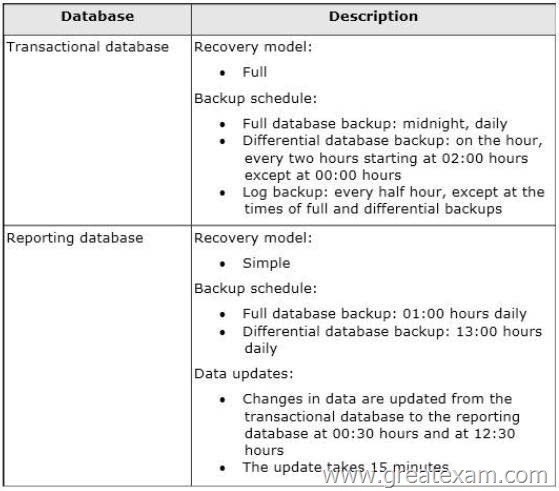
A. Restore the latest full backup, and restore the latest differential backup.
Then, restore the latest log backup.
B. Perform a point-in-time restore.
C. Restore the latest full backup.
D. Restore the latest full backup, and restore the latest differential backup. Then, restore each log backup taken before the time of failure from the most recent differential backup.
E. Restore the latest full backup. Then, restore the latest differential backup.
F. Restore the latest full backup. Then, restore each differential backup taken before the time of failure from the most recent full backup.
G. Perform a page restore.
H. Perform a partial restore.
Answer: C
QUESTION 71
You administer a Microsoft SQL Server 2012 server that hosts a transactional database and a reporting database.
The transactional database is updated through a web application and is operational throughout the day. The reporting database is only updated from the transactional database.
The recovery model and backup schedule are configured as shown in the following table:
At 14:00 hours, you discover that pages 71, 520, and 713 on one of the database files are corrupted on the reporting database.
You need to ensure that the databases are restored.
You also need to ensure that data loss is minimal.
What should you do?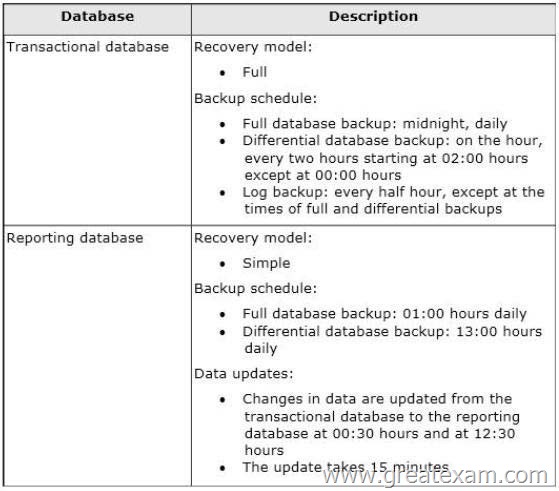
A. Perform a partial restore.
B. Restore the latest full backup, and restore the latest differential backup.
Then, restore each log backup taken before the time of failure from the most recent differential backup.
C. Restore the latest full backup.
D. Restore the latest full backup, and restore the latest differential backup.
Then, restore the latest log backup.
E. Perform a page restore.
F. Restore the latest full backup.
Then, restore each differential backup taken before the time of failure from the most recent full backup.
G. Perform a point-in-time restore.
H. Restore the latest full backup.
Then, restore the latest differential backup.
Answer: H
Explanation:
File restore
Restores a file or filegroup in a multi-filegroup database. Note that under the simple recovery model, the file must belong to a read-only filegroup. After a full file restore, a differential file backup can be restored.
Page restore
Restores individual pages. Page restore is available only under the full and bulk-logged recovery models
Piecemeal restore
Restores the database in stages, beginning with the primary filegroup and one or more secondary filegroups. A piecemeal restore begins with a RESTORE DATABASE using the PARTIAL option and specifying one or more secondary filegroups to be restored
QUESTION 72
You administer a Microsoft SQL Server 2012 server that hosts a transactional database and a reporting database.
The transactional database is updated through a web application and is operational throughout the day. The reporting database is only updated from the transactional database.
The recovery model and backup schedule are configured as shown in the following table:
At 16:20 hours, you discover that pages 17, 137, and 205 on one of the database files are corrupted on the transactional database.
You need to ensure that the transactional database is restored.
You also need to ensure that data loss is minimal.
What should you do?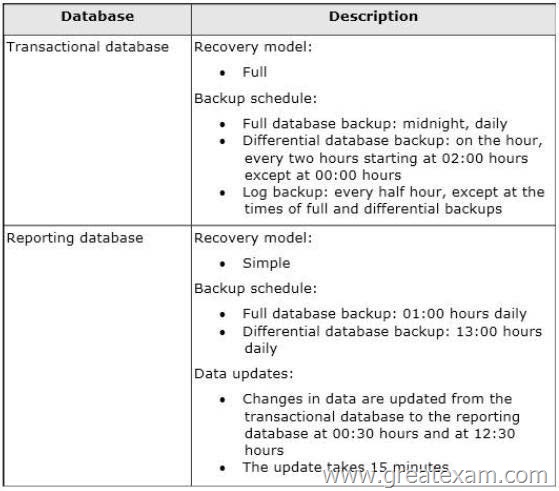
A. Perform a partial restore.
B. Restore the latest full backup, and restore the latest differential backup.
Then, restore each log backup taken before the time of failure from the most recent differential backup.
C. Perform a point-in-time restore.
D. Restore the latest full backup.
E. Restore the latest full backup, and restore the latest differential backup.
Then, restore the latest log backup.
F. Perform a page restore.
G. Restore the latest full backup.
Then, restore each differential backup taken before the time of failure from the most recent full backup.
H. Restore the latest full backup. Then, restore the latest differential backup.
Answer: F
Explanation:
Requirements for Restoring Pages
A page restore is subject to the following requirements:
– The databases must be using the full or bulk-logged recovery model. Some issues exist if you are using the bulk-logged model. For more information, see the following section.
– Pages in read-only filegroups cannot be restored. Trying to make a filegroup read-only will fail if there is a page restore going on at the same time in the filegroup.
– The restore sequence must start with a full, file, or filegroup backup.
– A page restore requires an unbroken chain of log backups up to the current log file, and they must all be applied so that the page is brought up to date with the current log file.
– As in a file-restore sequence, in each restore step, you can add more pages to the roll forward set.
– A database backup and page restore cannot be run at the same time.
Bulk-logged Recovery Model and Page Restore
For a database that uses the bulk-logged recovery model, page restore has the following additional conditions:
– Backing up while filegroup or page data is offline is problematic for bulk-logged data, because the offline data is not recorded in the log. Any offline page can prevent backing up the log. In this cases, consider using DBCC REPAIR, because this might cause less data loss than restoring to the most recent backup.
– If a log backup of a bulk-logged database encounters a bad page, it fails unless WITH CONTINUE_AFTER_ERROR is specified.
– Page restore generally does not work with bulk-logged recovery.
A best practice for performing page restore is to set the database to the full recovery model, and try a log backup. If the log backup works, you can continue with the page restore. If the log backup fails, you either have to lose work since the previous log backup or you have to try running DBCC must be run with the REPAIR_ALLOW_DATA_LOSS option.
QUESTION 73
You administer a Microsoft SQL Server 2012 server that hosts a transactional database and a reporting database.
The transactional database is updated through a web application and is operational throughout the day. The reporting database is only updated from the transactional database.
The recovery model and backup schedule are configured as shown in the following table:
One of the hard disk drives that stores the reporting database fails at 16:40 hours.
You need to ensure that the reporting database is restored.
You also need to ensure that data loss is minimal.
What should you do?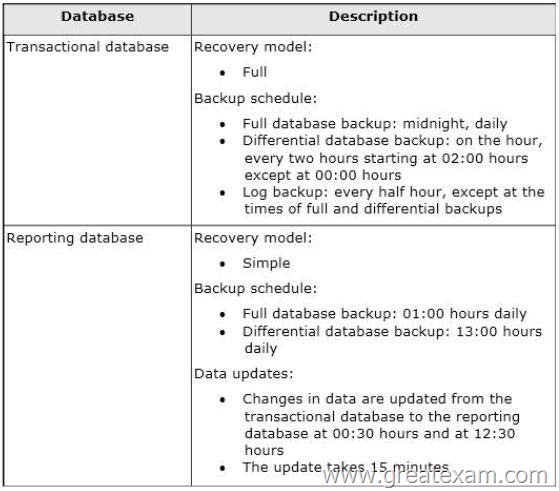
A. Restore the latest full backup.
Then, restore each differential backup taken before the time of failure from the most recent full backup.
B. Perform a partial restore.
C. Restore the latest full backup, and restore the latest differential backup.
Then, restore the latest log backup.
D. Perform a point-in-time restore.
E. Restore the latest full backup.
F. Perform a page restore.
G. Restore the latest full backup, and restore the latest differential backup.
Then, restore each log backup taken before the time of failure from the most recent differential backup.
H. Restore the latest full backup. Then, restore the latest differential backup.
Answer: H
Explanation:
The hard disk failure happens at 16:40 hrs.
QUESTION 74
Drag and Drop Question
You administer three Microsoft SQL Server 2012 servers named ServerA, ServerB, and ServerC. ServerA is the acting principal and ServerB is the mirror.
You need to add ServerC as a witness to the existing mirroring session between ServerA and ServerB.
You need to achieve this goal without delaying synchronization.
Which three actions should you perform in sequence? (To answer, move the appropriate actions from the list of actions to the answer area and arrange them in the correct order.)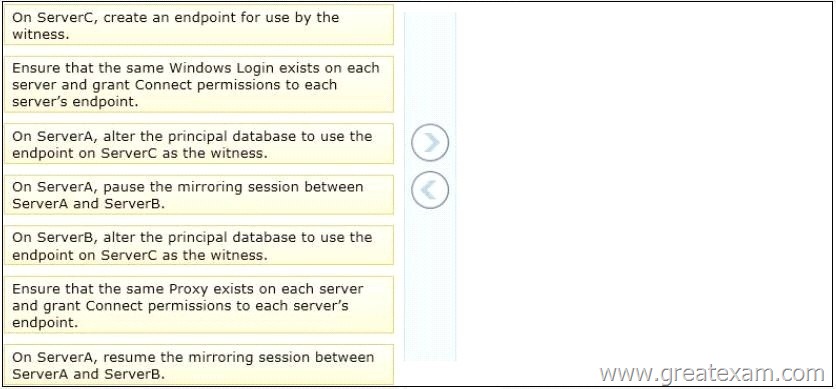
Answer: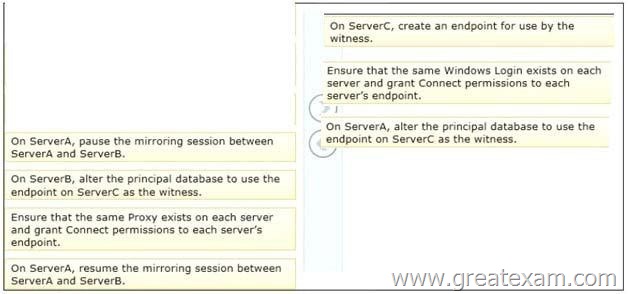
QUESTION 75
You administer a Microsoft SQL Server 2012 database.
You create an availability group named haContosoDbs.
Your primary replica is available at Server01\Contoso01.
You need to configure the availability group to have the highest availability.
You also need to ensure that no data is lost.
Which Transact-SQL statement should you use?
A. Option A
B. Option B
C. Option C
D. Option D
Answer: C
QUESTION 76
Drag and Drop Question
You administer several Microsoft SQL Server 2012 servers.
Your company has a number of offices across the world connected by using a wide area network (WAN).
Connections between offices vary significantly in both bandwidth and reliability.
You need to identify the correct replication method for each scenario.
What should you do? (To answer, drag the appropriate replication method or methods to the correct location or locations in the answer are a. Each replication method may be used once, more than once, or not at all.)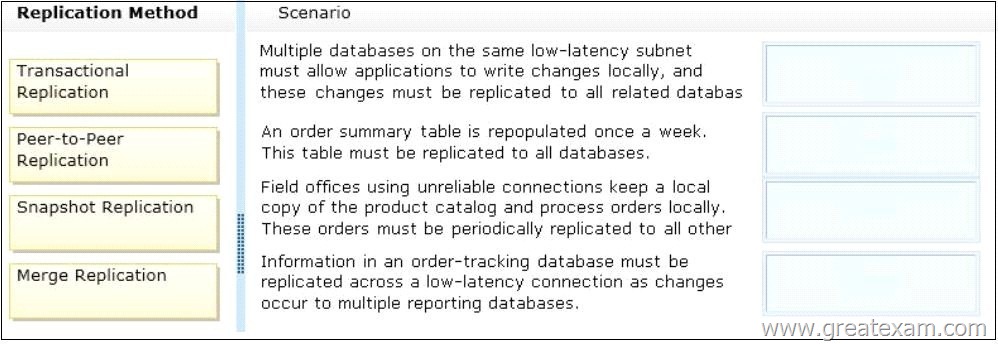
Answer: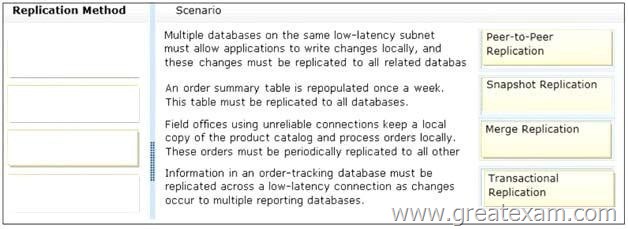
Explanation:
http://msdn.microsoft.com/en-us/library/ms151198.aspx
QUESTION 77
You administer several Microsoft SQL Server 2012 database servers.
Merge replication has been configured for an application that is distributed across offices throughout a wide area network (WAN).
Many of the tables involved in replication use the XML and varchar (max) data types. Occasionally, merge replication fails due to timeout errors.
You need to reduce the occurrence of these timeout errors.
What should you do?
A. Set the Merge agent on the problem subscribers to use the slow link agent profile.
B. Create a snapshot publication, and reconfigure the problem subscribers to use the snapshot publication.
C. Change the Merge agent on the problem subscribers to run continuously.
D. Set the Remote Connection Timeout on the Publisher to 0.
Answer: A
Explanation:
When replication is configured, a set of agent profiles is installed on the Distributor.
An agent profile contains a set of parameters that are used each time an agent runs: each agent logs in to the Distributor during its startup process and queries for the parameters in its profile.
For merge subscriptions that use Web synchronization, profiles are downloaded and stored at the Subscriber. If the profile is changed, the profile at the Subscriber is updated the next time the Merge Agent runs. For more information about Web synchronization, see Web Synchronization for Merge Replication.
Replication provides a default profile for each agent and additional predefined profiles for the
Log Reader Agent, Distribution Agent, and Merge Agent. In addition to the profiles provided, you can create profiles suited to your application requirements. An agent profile allows you to change key parameters easily for all agents associated with that profile. For example, if you have 20 Snapshot Agents and need to change the query timeout value (the – QueryTimeout parameter), you can update the profile used by the Snapshot Agents and all agents of that type will begin using the new value automatically the next time they run.
You might also have different profiles for different instances of an agent. For example, a Merge Agent that connects to the Publisher and Distributor over a dialup connection could use a set of parameters that are better suited to the slower communications link by using the slow link profile.
QUESTION 78
Drag and Drop Question
You administer two Microsoft SQL Server 2012 servers named ServerA and ServerB.
You use a database named AdventureWorks.
You need to prepare the AdventureWorks database for database mirroring.
ServerB will act as the mirror in a mirroring partnership along with ServerA.
Which three actions should you perform in sequence? (To answer, move the appropriate actions from the list of actions to the answer area and arrange them in the correct order.)
Answer: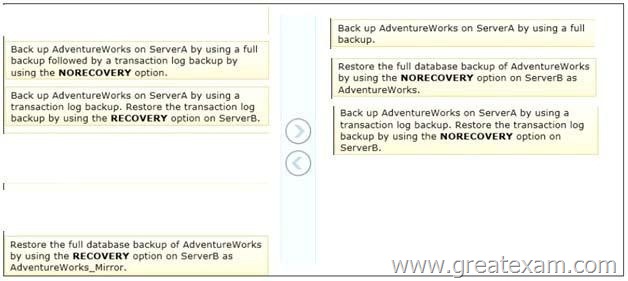
Explanation:
http://msdn.microsoft.com/en-us/library/ms189852.aspx
http://msdn.microsoft.com/en-us/library/ms190941.aspx
QUESTION 79
You create an availability group named HaContoso that has replicas named Server01/HA, Server02/HA, and Server03/HA.
Currently, Server01l/HA is the primary replica.
You need to ensure that the following requirements are met:
– Backup operations occur on Server02/HA.
– If Server02/HA is unavailable, backup operations occur on Server03/HA.
– Backup operations do not occur on Server01/HA.
How should you configure HaContoso?
A. set the backup preference of HaContoso to Prefer Secondary.
Set the backup priority of Server02/HA to 20.
Set the backup priority of Server03/HA to 10.
B. Set the backup preference of HaContoso to Secondary only.
Set the backup priority of Server02/HA to 20.
Set the backup priority of Server03/HA to 10.
C. Set the backup preference of HaContoso to Secondary only.
Set the backup priority of Server02/HA to 10.
Set the backup priority of Server03/HA to 20.
D. set the exclude replica of Server01/HA to true.
Set the backup priority of Server02/HA to 10.
Set the backup priority of Server03/HA to 20.
Answer: B
Explanation:
http://msdn.microsoft.com/en-us/library/ff877884.aspx
QUESTION 80
You administer a Microsoft SQL Server 2012 instance that has several SQL Server Agent jobs configured.
When SQL Server Agent jobs fail, the error messages returned by the job steps are truncated. The following error message is an example of the truncated error message:
“Executed as user CONTOSO\ServiceAccount. …0.4035.00 for 64-bit Copyright (C) Microsoft Corp 1984-2011. All rights reserved. Started 63513 PM Error 2012-06-23 183536.87 Code 0XC001000E Source UserImport Description Code 0x00000000 Source Log Import Activity Descript… The package execution fa… The step failed.”
You need to ensure that all the details of the job step failures are retained for SQL Server Agent jobs.
What should you do?
A. Expand agent logging to include information from all events.
B. Disable the Limit size of job history log feature.
C. Configure event forwarding.
D. Configure output files.
Answer: D
We offer standard exam questions of Microsoft 70-462 practice test. The standard exams are important if you have never taken a real exam. The accuracy of the Q&As are fully guaranteed and the number is enough to impact you passing the exam.